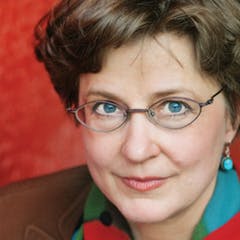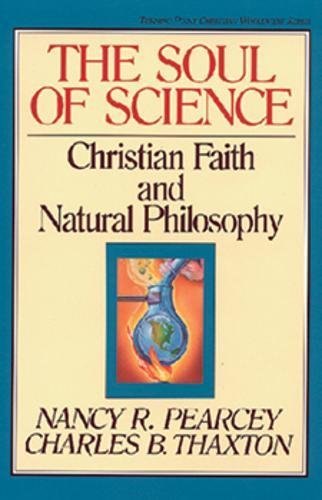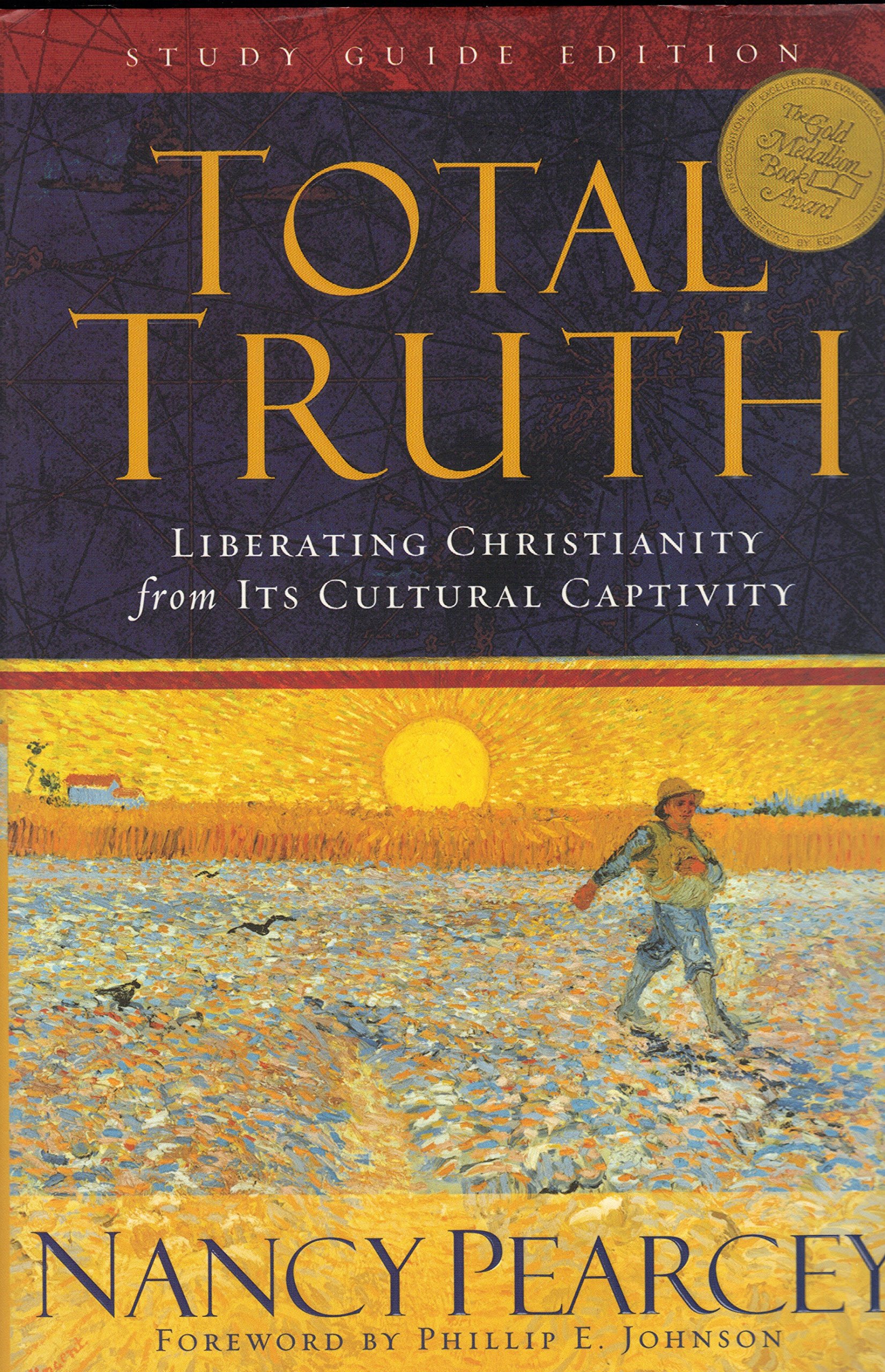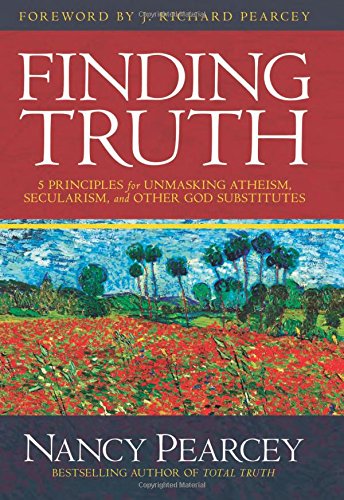Greetings, I’m Fred Zaspel, executive editor here at Books At a Glance, and we have a special guest with us today to talk about her work. If you’re one who reads books on apologetics, worldview, and cultural engagement, then you are probably familiar with the name Nancy Pearcey, Professor of Apologetics at Houston Baptist University. She is a prolific author whose works have gained outstanding attention, and we are very pleased to talk with her today about her work.
Nancy, welcome! It’s good to have you with us! And thanks for talking to us about your books.
Pearcey:
Thanks for having me, I appreciate it.
Zaspel:
First, tell us about your own history: how did your interest in all things worldview and apologetics come about?
Pearcey:
It came about because it was so crucial to my own conversion. I was raised in a Christian home, but I was going to secular high school and began having questions about my religious upbringing. Unfortunately, at that time there weren’t a lot of people who knew much about apologetics, so when I started asking questions – just, really, how do we know it’s true? That was the main thing I wanted to know. How do we know Christianity is true? I was in public high school and all my teachers were secular, all my textbooks were secular, most of my friends were secular, and I just wanted to know how I could be sure Christianity was true. And, unfortunately nobody could give me any answers. I talked to a Christian university professor and I asked him, “Why are you a Christian?” And he said, “Works for me.”
Zaspel:
Oh, my!
Pearcey:
And I thought, “That’s it? You’re a university professor and that’s all you have?”
And then I had a chance to talk to a seminary Dean and I thought I would get some answers from him, and all he said was, “Don’t worry, we all have doubts sometimes.” And I thought, “In that case, why don’t you have some answers for my doubts?”
Zaspel:
Right. Good question!
Pearcey:
So, it was really after doing some searching and questioning like that, I decided that apparently Christianity just did not have any answers, any rational foundation, and I very intentionally, about halfway through high school, very intentionally gave it up and decided I was going to have to find truth on my own. I literally began walking down the hallway to the library at the public high school I attended and began pulling books off of the philosophy shelf because thought maybe this was where people asked questions of, “How do we know what’s true?” And, “How do we know if there’s a meaning to life?” And, “How do we know if there is a foundation for ethics?” Or whether we are all just on our own, figuring out what works for me and what works for you. After a couple years of that I was pretty much a complete relativist, a skeptic, and decided we really don’t know anything on our own. It seemed to me that if all I have is my own puny brain, within the vast reaches of time and space, then it’s pretty clear that we can’t have any sort of universal knowledge or universal truth. A couple of years later I was going to school in Germany. We had lived there when I was a kid, so I went back. And through some strange circumstances I ended up at L’Abri, which was the ministry of Francis and Edith Schaeffer. Schaeffer was the first person I ever heard who actually offered some kind of apologetics, who actually answered questions, (not only Schaeffer, but his staff, as well), who had studied enough of intellectual history to know what the secular arguments were and to have some answers. And I was completely stunned. I had just never met any Christians who could engage intelligently with secular ideas. In fact, I was so impressed that I left! After only a month, I left, because I was so impressed with the answers that they were giving me that I was afraid I might be drawn in emotionally, and I did not want to do that. I wanted to make sure it was a real conviction.
But through L’Abri I had discovered there was such a thing as apologetics, so I kept reading on my own. So that’s how I discovered CS Lewis and many others. And it was a year and a half later, I did become a Christian, purely on my own, and went back to L’Abri and that’s where I really got grounded in Christian worldview and apologetics.
So that’s the reason, really, I’ve always had such a passion for worldviews and apologetics. I would not have become a Christian if it weren’t for apologetics and people treating my questions seriously. Instead of acting as if something’s wrong with you if you have questions, Schaeffer’s favorite phrase was – we need to give honest answers to honest questions. And that’s what I encountered there and that’s what I tried to do in my own work.
Zaspel:
Facinating! Great story.
Since this is your first time with us, I’d like to back up and give our listeners a broad acquaintance with your work. Let’s start with your 1994 book with Charles Thaxton, The Soul of Science: Christian Faith and Natural Philosophy. What’s that all about?
Pearcey:
In The Soul of Science, what I did was go through the history of the relationship between science and Christianity from the time of the scientific revolution. People tend to think science and religion are at odds with one another. As I was writing the book, I kept running into Christians who thought that, which was a little surprising to me. I would tell them I’m writing a book on the relation of Christianity and science and they would say, “Is there a relationship? Aren’t they always hostile to one another?” And what people don’t realize, is that in The History and Philosophy of Science, (HIPS, it’s called), it is now a separate discipline at many universities. And in that discipline, it is widely known and widely acknowledged that Christianity actually had a positive and beneficial impact on the rise of modern science. And that’s of many basic presuppositions that you have to have for science to even be possible and that came from Christianity. For example, there’s one well-respected historian, not a Christian, who says that the very concept of laws in nature was never held by any other culture, East or West, ancient or modern; that it grew out of the Medieval West during a period when this culture, certainly the intellectual culture, was permeated by Christian thought and therefore the concept of laws in nature came from the notion that God was a lawgiver, as well as the creator. And so, in that context, the concept of laws of nature made perfect sense. But, it’s totally unique to that period. Many people don’t realize how much Christianity contributed to the rise of modern science.
Zaspel:
You co-authored some books with Chuck Colson, right?
Pearcey:
Yes. The one with Chuck Colson, How Now Shall We Live? was a book on Christian worldview. We couldn’t figure out how to structure the book and we finally decided that we were going to do the classic reformed outline of Creation, Fall, Redemption. And so, we have a whole section on Creation, a whole section on the Fall, and a whole section on Redemption. And of course, we had to expand a bit because most people think redemption just means a one-time conversion experience. And that’s not what it means. What it means is, yes, you are redeemed in the sense of the spiritual rebirth, but then you engage in a whole lifelong process of bringing Christian truth to every area of life. From your family life and your personal life to your professional life, to politics, education, economics, the arts, every area of life is meant to be seen through the lens of the Christian worldview.
So that book has had a tremendous impact in terms of helping Christians understand Christianity.
Zaspel:
This next title, from 2008, won you an award: Total Truth: Liberating Christianity from its Cultural Captivity. What are you after in this book?
Pearcey:
I wrote Total Truth right after How Now Shall We Live? and the reason for that was, in How Now Shall We Live? we were trying to help people to break out of the sacred/secular split and to realize that Christianity is not meant to be just something for church and Bible study and prayer meetings but is meant to inform all of your life. And as I realized how difficult it was to communicate that message to many people, I began investigating more deeply, where did the sacred/secular split come from, and why are we so trapped in it? So, in Total Truth, I go much more into the history of the sacred/secular split. Where did it come from? How did it get so embedded in American evangelical thinking? And how is it also reinforced by the secular world? In the secular world they have a similar split, but they call it the fact/value split. And the idea is the fact realm is the secular realm – that’s where we speak about objective truth, scientific truth, empirically knowable truths, that are universal, and everyone had better accept. Then in the value realm, according to the secular definition of values, is just your personal private opinions. And that’s where they put religion, morality, theology and so on. So that even when we try to break out of the sacred/secular split in the Christian world, the secular world pushes us back in. Using the fact/value split, they push us back into the private realm and say, “No, no, no, you can’t bring your Christian perspective into the public realm. You need to keep that in the private realm of your family and church, and don’t bring it into the public realm where you are claiming that it’s actually true.”
So, Total Truth helps people to recognize all the forces that are keeping Christianity privatized and marginalized, so that we are better prepared to bring it out into the public realm to have a redemptive impact on all of life.
Zaspel:
Okay, let’s talk about another of your titles, which I think is something of a sequel: Finding Truth: 15 Principles for Unmasking Atheism, Secularism, and Other Good Substitutes. This came out in 2015 and seems to have done well also. Tell us about it.
Pearcey:
Right. I really liked this book because, I don’t know about you, but if you read a lot of books on apologetics, you tend to get overwhelmed. You hear this secularism, and here’s an argument against it; and here’s this secularism, and here’s the argument against it; and here’s yet another ism, and the argument against it. And you begin to say, I’m never going to be able to remember all of these and I’m certainly not going to have them at the tip of my tongue when I’m talking to a real person. And so, in Finding Truth, I came up with one single strategy that you can use for all the isms, not only secularism’s but other religions as well. And what’s really exciting about it is it’s based on Romans 1. So, it’s not a man-made system, it’s not a human system, it’s based on God’s Word. In Romans 1, it says if you don’t worship the God, the transcendent creator of the Bible, you will worship something within the created order. And, of course, that doesn’t mean just golden calves, it can also mean something like – take materialism, which is the dominant worldview in the academic world today – materialism says what’s ultimately real is matter. That’s the ultimate reality; that’s the uncaused cause of everything else. Well, in that sense, it functions as an idol; it functions as a God substitute; it functions as the creator substitute. And so, it fits the category of idols in Romans 1. And I show how you can do an idol analysis on all of the major isms. It also gives strategies for showing why each one of them doesn’t work. What’s exciting about it is that it equips readers with one major strategy, rooted in God’s word, that you can then apply to any area, any ism, any theory, any outlook, any religion. And it’s wonderfully empowering.
Zaspel:
Wonderful. Wonderful. I think we need to have you back to talk about that one a little bit further.
Your 2017 book has a curious title: Saving Leonardo. What’s this all about?
Pearcey:
Right. Well, this book is especially for creative people because it shows that ideas and worldviews permeate a culture through arts, literature, music, movies, and so on. It helps train people in how to recognize worldviews when they come to us, not in words, where they are easier to recognize, but, what happens when they come to us in plot line, in characterization, in the composition of an image in a painting, for example? What happens when they come to us in these artistic forms? How do we recognize them, then? Which, in some ways, is more important because, after all, that’s how most of us get our ideas about life. We don’t say, “Oh, I need a worldview,” and then go sign up at the local university for a philosophy course. We pick up our ideas about life from the books we read, and the movies we watch, and the music we listen to. So this is really a crucial skill that everyone needs to learn is how to recognize and critique ideas, worldviews, when they come to us through these cultural forms.
Zaspel:
And now your latest book, just released (2018), is Love Thy Body: Answering Hard Questions about Life and Sexuality. We will be talking to you about this book in a separate interview, but maybe you can tell us just briefly what this is all about.
Pearcey:
This book addresses the moral issues that we are barraged with these days in the headlines. Things like abortion, euthanasia, assisted suicide, homosexuality, transgenderism, the hookup culture – all of these moral issues. And once again what I’m doing is showing the underlying worldview. There actually is a common underlying secular worldview behind all of these issues. We tend to try to deal with them one at a time, and they keep popping up, like playing Whack a Mole. They keep popping up and we keep reacting against them. And it’s so much more effective if we recognize the underlying worldview and are able to deal with that. Instead of being reactionary, we can be proactive. We can actually get ahead of the curve and respond to these issues in a much more effective way.
Zaspel:
We should mention here also that you recently wrote an article on this subject that was published on Fox News website. Our listeners can follow the link and get a taste of your book also.
Let’s talk about the other books that you did with Chuck Colson. You’ve got a few of them; let’s pick up on that again.
Pearcey:
Well, the first one was A Dance with Deception. I was the founding editor of BreakPoint. You may know the radio program, BreakPoint. I was actually the founding editor of BreakPoint, writing the commentaries, editing radio commentaries by other writers. We had a writing staff, we had freelance writers, we had quite a few people contributing. Because it was a daily program, we really needed a wide range of expertise to address so many different topics. Anyway, A Dance with Deception was the first book that we put out that was a collection of BreakPoint commentaries. When I started BreakPoint, to be frank, it was supposed to just be a kind of publicity piece. I don’t know if you know this, but, a lot of organizations will have their president do a five-minute commentary and it’s primarily a fund-raising device. And that’s how Prison Fellowship saw it when they first hired me. But I wasn’t about to let it just be a fund-raising device. I said, “No, no, we’re going to have a genuine teaching piece, that’s going to teach people Christian worldview. We’ll take current events, but we’re going to then teach the Christian worldview that informs these events.” So that’s what BreakPoint turned out to be. It does take current events because that’s the hook, that’s what people are reading about, that’s what they are interested in. But then you take them behind the scenes, and you try to educate them on the underlying worldviews, trends, and conflicts that are going on behind these current events. Current events are sort of like waves on the surface of the ocean; but worldviews are the underlying tectonic plates that are really causing those waves; and that’s what we tried to educate people on how to dig down more deeply. So the first book with Chuck was A Dance with Deception and it was a collection of BreakPoint commentaries.
Zaspel:
Any others?
Pearcey:
Yes. Actually, some of them, I think, are out-of-print. The only book I’ve ever written, actually, that’s out-of-print was A Dangerous Grace, and it was the same thing. It was a collection of BreakPoint commentaries. BreakPoint, being a daily commentary, was producing so much material that we actually put out a couple of books that were essentially collections of BreakPoint commentaries.
Zaspel:
You have several others, like Science and Evolution and The Problem of Evil.
Pearcey:
Those are just breakouts of How Now Shall We Live? Because How Now Shall We Live? did so well, the publisher thought it might be helpful for some people, if we broke out some of the sections and published them as separate books. I think there were three. The Problem of Evil, The Christian in Today’s Culture, Science and Evolution – these were all just breakouts from How Now Shall We Live
Zaspel:
Are you working on any other projects that you can tell us about?
Pearcey:
Well, I did sign a two-book contract with Baker when I signed the contract for Love Thy Body. I think—this isn’t in stone yet, but I think my next book will be How to Keep Your Kids Christian in College. My concern is that I meet so many parents, even good, strong Christian parents who’ve raised their kids in a very consistent way, educating them well on what Christianity is all about, and still the kids go off to college and lose their faith. I think a lot of it is because they haven’t been introduced to the challenges they are going to face. Here’s the most recent example: I met a mother whose son went off to Texas A&M (I’m here in Texas) to study psychology, and he lost his faith within the first semester. It turned out he never really knew that in psychology the major theories are very anti-Christian. Ever since Freud, psychology has treated Christianity as an infantile regression, to use Freud’s term, a projection of the imaginary father figure into the sky. And he didn’t know that, so he was totally blown away by it. I couldn’t say this to the mother, but my thought was, “You didn’t tell him? You didn’t tell him what he was going to encounter?”
So, what if I wrote a book where I said, okay, you’re going to go study psychology—here are the major theories. Here’s what they say, and here’s how you can critique them, and here’s the Christian perspective. There’s no book out there that does that, that just takes the major fields and says, to young people, here’s what you’re going to encounter – be ready for it.
Zaspel:
You write that, and I’ll buy a copy for each of the youth in our church during their high school years and make sure they read it. Absolutely.
One last question. Say one of our listeners has not yet read your works. Where would you suggest they start?
Pearcey:
Wow, that’s a hard one because I get a lot of feedback. I’m pretty active on Facebook and since doing that, I’ve been getting a lot more feedback from readers. And it’s fascinating, because they all like a different book. Some of them say, “Total Truth is still my favorite one, because that’s the one that really lays out how to have a Christian perspective in every area.” And somebody else says, “My favorite book is Saving Leonardo, because I love the intellectual and cultural history; getting the cultural side of it is so fascinating. It pulls together the cognitive and the creative by bringing in the arts.” And somebody else says, “No, no, no, I love Finding Truth the best, because he gives that single unified strategy that you can then apply everywhere and it has so simplified your ability to analyze different worldviews and systems of thought.” So, it all depends, I think, on what you want. I would say maybe one other consideration is the level of the writing. Every book gets a little simpler. Every book I write, I write on a simpler level so that my most recent one, Love Thy Body, tests out as 10th grade reading level. And Finding Truth tested out at 10th through 11th, Saving Leonardo was 11th grade. But, Total Truth is a little more demanding. So that’s another consideration, perhaps, if you want to start with the easiest read, then my most recent book is the easiest read.
Zaspel:
We’re talking to Nancy Pearcey, author of a variety of excellent books related to worldviews and cultural engagement. Her books have proven very helpful to many, and we appreciate her talking to us about it here today. We will be back with her again to talk about her newest book, as well, so stay tuned for that.
Nancy, thanks so much.
Pearcey:
Thanks for having me. I appreciate it.



